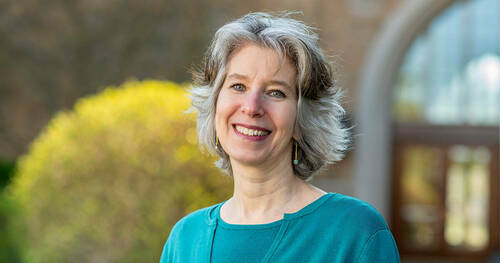
Nora J. Besansky, the O’Hara Professor in the Department of Biological Sciences at the University of Notre Dame, has been elected to membership in the National Academy of Sciences.
Besansky, an expert in the genomics of malaria vectors, has applied several genomic technologies to deepen the understanding of the relationship between malaria-transmitting mosquitoes and their environments. Research in her laboratory has been aimed at uncovering how two genetic processes — chromosome structural rearrangements known as inversions, and the transfer of genes between species known as introgression — contribute to enhanced ability to transmit disease.
She is currently working on developing novel genomic resources and tools, including molecular inversion genotyping, to further her research.
“Professor Besansky is a distinguished scientist whose research into the genomics of malaria vectors has provided profound contributions to the field of vector biology,” said Mary Galvin, the William K. Warren Foundation Dean of the College of Science. “Induction into the National Academy of Sciences is one of the highest honors a scientist can receive, and we in the College of Science are very proud of Nora for not only this distinction, but also for her significant research achievements.”
Her research focuses on groups of closely related related Anopheles species — species so closely related that they cannot be differentiated under a microscope — to determine what allows some of them to thrive and spread disease efficiently, while others play no role, or only a minor role, in disease transmission. A key to this puzzle is “ecological plasticity,” which allows the mosquitoes to thrive and be efficient vectors in a wide variety of environments, whether they are found in rainforests or in semi-deserts.
Fully understanding the evolutionary, ecological and functional genomics of malaria vectors will allow scientists to develop new control strategies that can interrupt transmission of the disease. Public health success against malaria has long been fragile because mosquitoes quickly develop resistance to insecticides, and the primary tool to stop the spread of the disease has been the bed net, which by itself is not sufficient to interrupt transmission.
“Through her many years of research into the genomics of malaria, Nora has had a tremendous impact on the field and significantly advanced our University’s pioneering efforts into vector-borne infectious diseases,” said Thomas G. Burish, the Charles and Jill Fischer Provost at Notre Dame. “We are thrilled to see her work recognized with this well-deserved honor.”
Besansky said she was shocked when she received the phone call telling her she was elected into the NAS.
“My first thought was one of disbelief,” she said. “My second thought was gratitude for my numerous students, trainees, mentors, collaborators and support team, without whom this would have been impossible.
“And the third thought is a feeling of great responsibility, given the mission that the NAS is charged with. It’s a great opportunity for me. I will be in the company of giants — with people I never thought I would rub shoulders with.”
Besansky earned her doctoral degree from Yale University in 1990, after earning her bachelor’s degree in biology from Oberlin College. She worked as a postdoctoral research fellow for the Centers for Disease Control, and was a staff scientist at the CDC from 1991 to 1997, during which time she also worked as an adjunct assistant professor in the Department of Biology at Emory University. She was hired as an associate professor in the Department of Biology at Notre Dame in 1997. In 2002 she was promoted to full professor, and became the O’Hara Professor in 2010. She is affiliated with Notre Dame’s Eck Institute for Global Health.
From 2005 to 2015, Besansky coordinated two large international genome sequencing and analysis projects sponsored by the National Institutes of Health (NIH), making genomic resources available to the scientific community for more than 16 malaria vector species. She was named a fellow of the American Association for the Advancement of Science in 2005, the American Society for Tropical Medicine and Hygiene in 2014, the Royal Entomological Society in 2016 and the Entomological Society of America in 2017. She has published more than 140 papers and mentored 30 graduate students and postdoctoral fellows. In addition to the NIH, her research has received support from the World Health Organization and the Bill & Melinda Gates Foundation.
Besansky is one of 120 members and 26 international members elected into the NAS for 2020, bringing the total number of active members to 2,403 and the number of international members to 501.
“It is not an exaggeration to say that the insights from her work will have a profound impact on the implementation and management of malaria control strategies,” said Crislyn D’Souza-Schorey, the Morris Pollard Professor and Chair of the Department of Biological Sciences at Notre Dame. “My colleagues and I are both delighted and proud to see Nora’s outstanding contributions recognized by her election to the NAS.”
Originally published by at science.nd.edu on May 1.